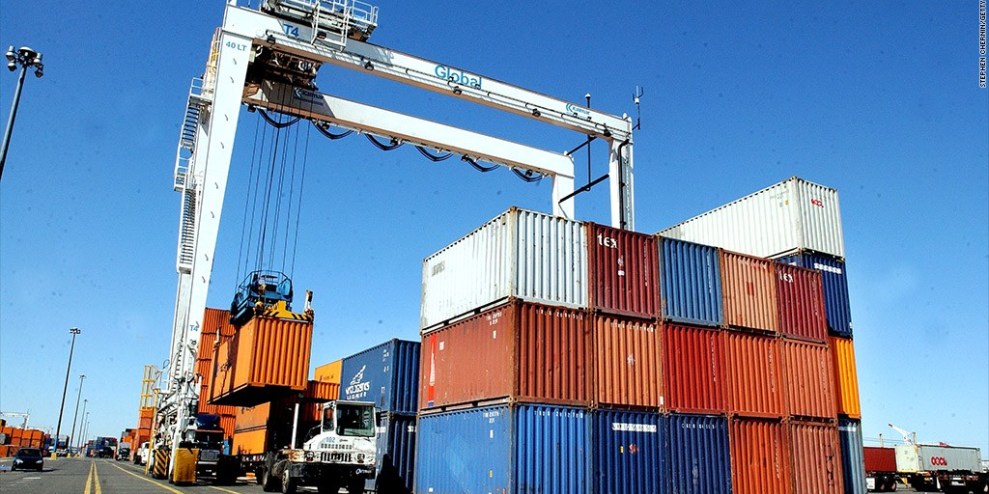Nigeria’s total foreign trade (value of exports and imports) hit N8.60 trillion in the second quarter (Q2) of 2019, up from N8.24 trillion recorded in the previous quarter (Q1). According to the latest foreign trade report released by the National Bureau of Statistics (NBS), this means Nigeria’s total trade rose by 4.4% within the quarter.
According to the NBS report, in Q2, 2019, the value of Nigeria’s total foreign trade stood at N8.60 trillion comprising 46.6% imports (N4 trillion) and 53.4% exports (N4.59 trillion).
Number Breakdown: The report further shows that the value of Nigeria’s total trade in Q2 2019 was higher by 4.4% when compared to Q1 2019, but 24.2% higher when compared with Q2, 2018.
- The trade balance remained favourable, valued at N588.8 billion.
- Total crude oil export was estimated at N2.65 trillion, while non-crude oil export was N661 billion and non-oils exports were put at N227.6 billion.
- Combined with the Q1 2019 performance, Nigeria’s trade balance declined by 63.14% relative to the same period in 2018.
- The value of total trade at half-year 2019 was 15.43% higher than for the same period in 2018.

Exports’ Performance: The value of total exports in Q2 2019 increased by 1.34% against the level recorded in Q1, 2019 and 2.06% when compared with its value in Q2, 2018.
- Exports by sectors show that crude oil export accounted for almost 90% of Nigeria’s total export in Q2 2019. Crude oil export in Q2 was estimated at N3.9 trillion, from N3.3 trillion recorded in Q1 2019.
- The value of Agricultural exports in Q2 was 14.66% lower than in Q1 2019. In Q1 2019, Agricultural goods exports were estimated at N73 billion, as against N86 billion in Q2.
- The value of Raw material exports was 14.52% lower than the value in Q1 2019 and 1.71% lower than in Q2 2018.
- The value of Solid mineral exports declined by 15.53% compared to Q1 2019 and 62.27% against the corresponding quarter in 2018.
- Also, the exports of Energy goods dropped by 12.31% in value compared to Q1 2019 and 15.15% when compared with Q2 2018.
- Lastly, the value of manufactured exports decreased by 77.05% when compared with the value recorded in Q1 2019. In Q1 2019, Nigeria exported N462 billion worth of goods, while the value dropped significantly to N462.2 billion in Q2.

Imports surged: The NBS noted that the performance of Nigeria’s trade for Q2 was largely as a result of stronger growth in the value of imports far outpacing growth in the value of exports which rose only marginally.
- In Q2 2019, Nigeria’s imports constituted 74.52% of manufactured goods. A total of N2.47 manufactured goods was imported into the country. Specifically, the value of imported manufactured goods decreased by 10.86% in Q2 2019 against the value recorded in Q1 2019.
- The value of imported Agricultural products was 5.79% higher in Q2 2019. Basically, the country imported N249.9 billion worth of agricultural goods.
- Also, the raw material was one of the major goods imported into the country in Q2 estimated N346.4 billion. In total, Nigeria’s raw material imports grew 4.97% over the value recorded in Q1 2019.
- Similarly, the value of Solid minerals imports was 63.46% higher than in Q1, 2019 and 68.34% higher than the value recorded in Q2 2018.
- Lastly, the value of energy goods imports was 74.65% lower than in Q1, 2019.

Key Takeaways: From the report, though Nigeria’s trade balance (export-import) is still positive, it dropped significantly by N242.8 billion. This was largely triggered by rise in imports.
- According to NBS, the value of total exports has remained relatively stable since 2018, but the value of imports has maintained its steady rise, hence the decline in trade balance since mid-2018.
- This means import has grown faster than export, and this is not good for the economy as trade deficit may be in sight.
- Also, agricultural commodities export declined, while manufactured goods imported into the country dropped.
- The Bureau noted that the slower growth in exports could be attributed to a combination of slower growth in the value of crude oil exports occurring at the same time as a decline in the value of non-crude oil exports.
- While total trade has hit a new height, Nigeria’s export revenue still significantly depends on crude oil, whose price is subject to fundamentals in the international market.
















